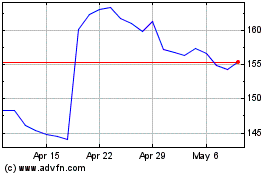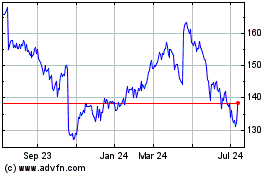Icahn Revenue Up Auto-Repair Deals -- WSJ
June 03 2017 - 3:02AM
Dow Jones News
Billionaire investor sees bigger car fleets needing national
service network
By Austen Hufford
Carl Icahn is raising his bet that Americans won't fix their own
cars, and that eventually many might not even own one.
Mr. Icahn has spent the past few years making deals aimed at
extending his automotive-service network nationwide, as
increasingly complex cars have their owners relying more on
professionals for repairs. On Friday, Icahn Automotive Group LLC
agreed to buy car-service chain Precision Auto Care Inc. for about
$35 million. The deal would add 250 locations to the billionaire
investor's 1,000 existing shops.
"We're positioning ourselves well to take advantage of an
increase in fleets," Mr. Icahn said in an interview, as he expects
ride-hailing and -sharing services to displace some personal-car
ownership and sees rental-car fleets expanding to accommodate those
without their own autos.
Mr. Icahn's goal is to build a company with nationwide reach
that can make, sell and install parts, having recently bought
parts-and-repair chains Pep Boys and Just Brakes as well as
auto-parts distributor Auto Plus. He also took parts maker
Federal-Mogul Holdings Corp. private earlier this year after owning
a significant stake for a decade.
He also owns stakes in ride-hailing service Lyft Inc. and
car-rental company Hertz Global Holdings Inc., which has a
partnership through which Lyft drivers can rent vehicles if they
don't have their own. Mr. Icahn thinks far-flung fleet chains and
ride-hailing companies could benefit from national service
providers in an industry that is often served by local shops and
regional chains.
"I have a whole team out there buying installers," he said. "We
want to build a really large national footprint servicing the
fleets."
Nick Mitchell, an analyst for Northcoast Research, said fleet
managers could potentially rely on larger chains for maintenance,
though they also could opt to do much of their work in-house,
potentially limiting the opportunities for a national, branded
service chain.
Mr. Mitchell also said expanding up and down the supply chain
risks alienating current customers and suppliers who could be
hesitant to do business with a direct competitor. "If you are going
to be vertically integrated, you only have one choice and that's to
go big -- and to go big fast," he said.
The push to own the business from start to finish -- from making
parts to selling and installing them to owning a slice of the
companies putting the cars on the roads -- accompanies a steady
decline of the shade-tree mechanic as cars become harder and more
expensive to work on at home. Consumers' automotive know-how is
decreasing, Icahn Enterprises LP said in its annual report in
March.
Many cars are more tightly packed under the hood than in the
heyday of do-it-yourself mechanic work, and some cars with more
complex electronics can require expensive tools to diagnose and fix
problems. That can even squeeze out some mom-and-pop shops for whom
the investment in those tools might not be worthwhile.
A recent report from market-research company IBISWorld Inc. said
the increasing complexity of auto repairs requires mechanics who
are more highly trained, which drives up wages. The report also
said that it is becoming more expensive to obtain more complex
repair information from manufacturers.
Meanwhile, cars are lasting longer. Last year, the number of
vehicles in operation hit a record in the U.S. as the average
lifespan of cars and trucks continues to lengthen, giving a boost
to the service providers and parts makers whose business it is to
keep cars on the road. The average age of cars and light trucks hit
11.6 years in 2016, according to data from IHS Markit.
To be sure, the rental-car industry and Hertz in particular have
struggled of late, with Hertz pouring money into turnaround
efforts. The company reported a much wider-than-expected quarterly
loss last month, and shares have plunged 76% in the past year,
including a 56% drop in the past three months.
Parts sellers also haven't fared well, with shares of AutoZone
Inc., O'Reilly Automotive Inc., Genuine Parts Co. and Advance Auto
Parts Inc. all in the red so far this year and over the past 12
months. Mr. Mitchell said a later tax-refund season and more mild
weather has hurt those companies recently.
Icahn Automotive Chief Executive Daniel Ninivaggi said Friday's
deal for Precision Auto is the next step in building out its
network. Precision has centers in 26 states, mainly in Georgia,
North Carolina and South Carolina. Its over-the-counter-traded
shares rose 90% to $1.54 after the deal announcement on Friday.
Corrections & Amplifications Precision Auto Care is traded
on the over-the-counter markets. An earlier version of this article
incorrectly stated the company was privately held. (June 2,
2017)
Write to Austen Hufford at austen.hufford@wsj.com
(END) Dow Jones Newswires
June 03, 2017 02:47 ET (06:47 GMT)
Copyright (c) 2017 Dow Jones & Company, Inc.
Genuine Parts (NYSE:GPC)
Historical Stock Chart
From Mar 2024 to Apr 2024

Genuine Parts (NYSE:GPC)
Historical Stock Chart
From Apr 2023 to Apr 2024
